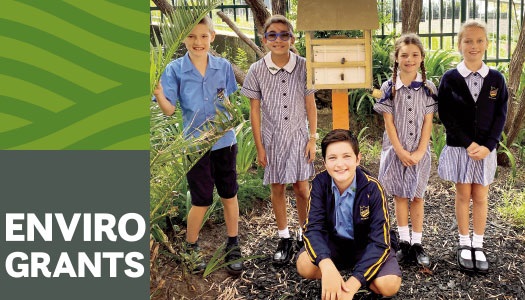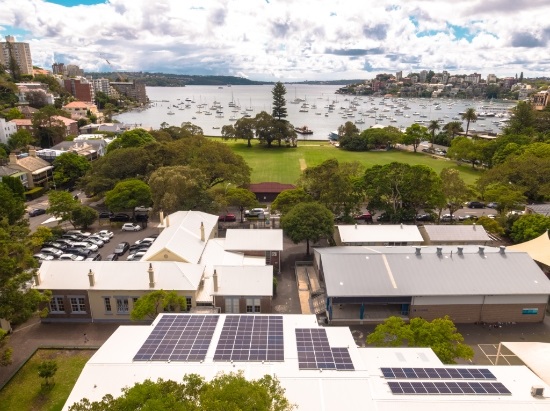Environmental Grants

Native Nature Nook at McAuley Catholic Primary School - Environmental Grant Recipient
Our Environmental Grants for 2025/26 are now open!
Applications are now open for Small Grants of up to $3,000 and Large Grants of between $3,001 and $7,500. Applications close 11 May 2025.
The key dates for 2025/2026 are:
- 31 March 2025 - grant applications open
- 11 May 2025 - grant applications close
- Late June 2025 - grants announced
- 1 July 2025 - grant projects can commence
Apply here
Who can apply?
Environmental grants are open to:
- Schools in Woollahra Council area
- Non-profit early learning centres
- Non-profit community organisations.
Individuals and businesses are not eligible for this grant stream.
What types of projects can be funded?
There are many types of projects that may be suitable for environmental grant funding. Council has an ongoing focus on climate change action and we encourage projects that help reduce carbon emissions and minimise waste.
Examples of projects that may be considered for Environmental Grants include:
- Energy saving initiatives e.g. solar installations or LED lighting upgrades
- Water saving initiatives e.g. smart sprinkler systems or water tanks
- Waste minimisation/recycling initiatives e.g. reusable plates and cups for canteens
- Habitat support e.g. clean-up activities on beaches or in reserves or bush regeneration
- Biodiversity projects e.g. small bird habitat gardens, bush tucker gardens or native bee hives, and
- Cooling your school through tree planting.
- Active transport projects e.g. installing bike racks for student use.
Policy and Guidelines
Our Grants Policy(PDF, 899KB) (2023) and Grants Guidelines(PDF, 292KB) (2023) provide the important details you'll need about eligibility, funding streams and selection criteria.
3 top tips when applying for a grant
1. Projects with clear, measurable environmental benefits have the greatest chance of success.
A key question to answer is: How will your project protect and/or enhance the local environment? Here are some examples of how to show the environmental benefits for several different types of project applications:
- We will install a 20kW solar system that will produce 26,530 kWh of energy per year, avoiding more than 23 tonnes of carbon emissions annually.
- LED lighting upgrades for our community centre will reduce our energy consumption by approximately 3,505kWh per year, reducing our emissions by 3.29 tonnes of carbon per year and saving on our bills.
- We're adding green waste caddies to 20 classrooms. Collecting around 20kg of food scraps each week and reducing waste to landfill by about 800kg per year. This will go to our worm farms, creating fresh compost for the school garden.
- Our native garden project will plant 5 mature trees (100L tree about 2m tall), 20 shrubs and 30 groundcover plants. Our native plants species list and garden plan sketch are attached.
2. Check your project is eligible.
Businesses and individuals are not eligible for this grant stream. Only local non-profit organisations, schools and non-profit early learning centres can apply.
- You cannot apply for funds to cover wages for your staff but you can pay for a contractor to implement your project.
- Your organisation must be located in the Woollahra Council local area.
- Check the Policy(PDF, 899KB) and Guidelines(PDF, 292KB) for full details so you don't waste your time if your project or group is not eligible.
3. Ensure your project is well planned.
- Liaise with key people early to plan your project and check you have permissions to do what you want to and where you want to.
- Create a realistic budget that covers all important elements. For example, don't forget to budget for soil if you are doing a garden project. Be aware that on completion of the project you will need to provide receipts to Council to demonstrate that the funds have been spent in accordance with the budget. They cannot be spent on anything other than the approved project.
- For planting projects, it is best to have a mud map sketch of the planting area with approximate dimensions and a species list for what you will plant. Consider other key elements to make the garden changes successful including low fences, water sources, maintenance and care.
Other support information

Double Bay Public School Rooftop Solar
Successful projects from previous years
You can see the list of previous successful applicants and their projects below.
Woollahra Council Grants & Sponsorship Information Webinar
Watch a recording on the webinar below to learn about Council's grants & sponsorships, how to address the selection criteria and maximise your chance of a successful application.
Enquiries
For more information, please contact:
Environmental Education Officer
Telephone: 9391 7095
Email: sustainability@woollahra.nsw.gov.au